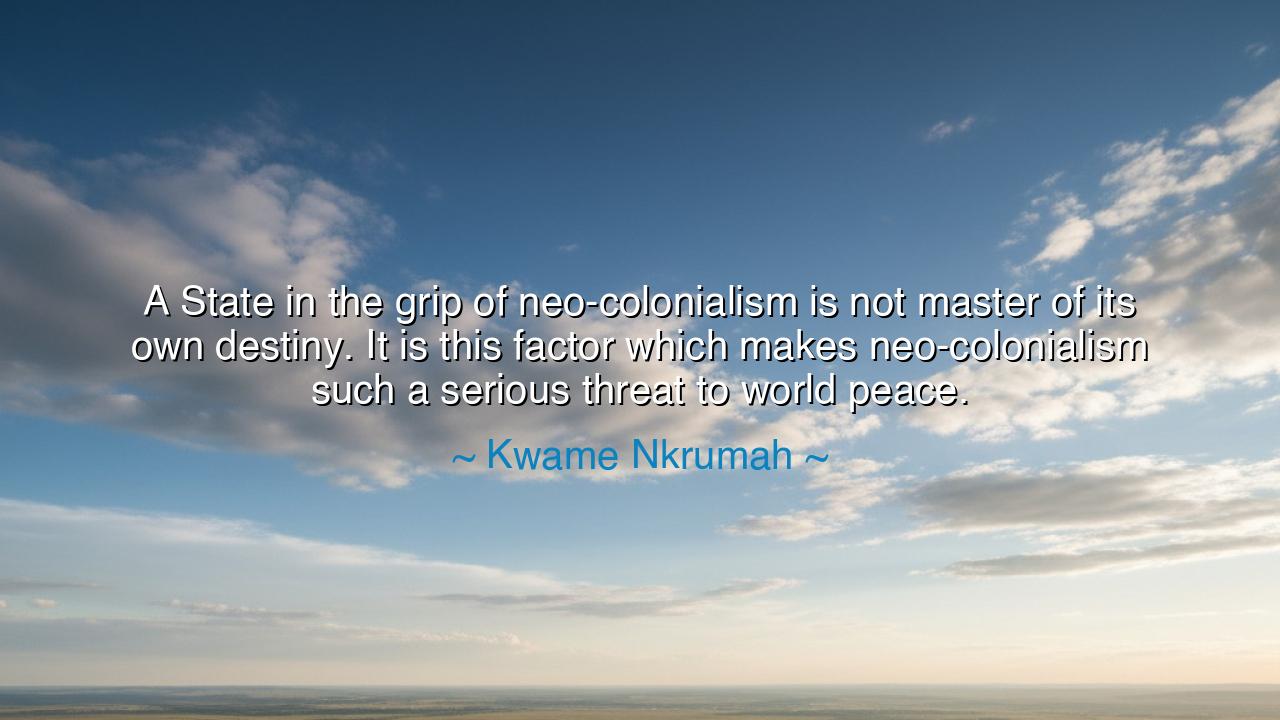
A State in the grip of neo-colonialism is not master of its own
A State in the grip of neo-colonialism is not master of its own destiny. It is this factor which makes neo-colonialism such a serious threat to world peace.






Kwame Nkrumah, the fiery son of Africa and a prophet of freedom, declared with thunder in his voice: “A State in the grip of neo-colonialism is not master of its own destiny. It is this factor which makes neo-colonialism such a serious threat to world peace.” These words are more than a warning; they are a cry of defiance against the invisible chains that linger after the visible chains have been broken. For though the flag may change, and the anthem may rise, if the wealth of a people is drained by foreign hands, if the policies of a nation are written in another’s capital, then that State is free only in name, but enslaved in truth.
The ancients understood that freedom without sovereignty is but a shadow. What is the use of a king’s crown if the treasury is emptied by strangers? What is the worth of a people’s independence if their soil yields fruit for others and famine for themselves? Thus, neo-colonialism, more subtle than conquest by sword, creeps in with loans, with contracts, with promises gilded in gold but forged in chains. And the nation that falls into its snare finds that its destiny no longer flows from its own heart, but from the will of powers beyond its shores.
History bears witness in the story of Ghana itself, the first African nation to rise from colonial bondage in 1957. Nkrumah, its leader, raised high the banner of independence and spoke of a continent united, free, and sovereign. Yet even as the Union Jack was lowered, foreign corporations and governments sought to keep their grip upon Ghana’s gold, cocoa, and wealth. They offered aid, but tied it with conditions; they invested, but drained profits away. This, Nkrumah saw, was the new battle: not the struggle against imperial soldiers, but against imperial merchants and bankers. And he declared that until Africa broke these hidden chains, it could never be truly free.
Look, too, to the fate of the Congo. Patrice Lumumba, its first prime minister, sought to steer his country into a future of dignity. But the riches of the Congo — copper, cobalt, diamonds — were coveted by foreign interests. Lumumba resisted, and for his defiance he was betrayed, overthrown, and slain. His country, though independent in name, became a playground for powers that cared not for its people. Here again, neo-colonialism revealed its cruel hand: it was not merely a local tragedy, but a spark that deepened Cold War rivalries, threatening peace across the world.
Nkrumah’s words remain urgent, for even in our age, the ghost of neo-colonialism still stalks the earth. It comes through debts that cannot be repaid, through trade deals that favor the strong and exploit the weak, through military “aid” that binds nations to foreign interests. And wherever a nation is denied the right to chart its own destiny, unrest brews, wars ignite, and peace is imperiled. For peace is not merely the absence of war — it is the presence of justice, dignity, and sovereignty.
The lesson, O seekers of wisdom, is clear: a people must guard their independence not only with arms, but with vigilance of mind and strength of unity. True freedom is not won in a day, nor secured by a single declaration. It must be defended in the marketplace, in the school, in the parliament, in the very soul of the people. Nations must learn to build together, to trade fairly among themselves, to cultivate self-reliance, so that no outside power may hold the keys to their destiny.
And for each of us, the teaching is the same: do not mistake the appearance of freedom for its substance. In your own life, ask — do I govern myself, or do I live by the dictates of others who profit from my labor? A man enslaved by debt, by false promises, by blind imitation of foreign ways is no different from a nation under neo-colonialism. Therefore, seek always to master your own path, to live by your own values, to build strength not by dependence, but by wisdom and courage.
So let it be spoken, and let it be remembered: a State in the grip of neo-colonialism is not master of its own destiny. And a people who surrender their sovereignty surrender their peace. But a people who guard their independence with vigilance, and unite with justice at their core, become unshakable. They rise not as subjects of others, but as masters of their own fate, bringing forth not only their freedom, but the peace of the world.






AAdministratorAdministrator
Welcome, honored guests. Please leave a comment, we will respond soon